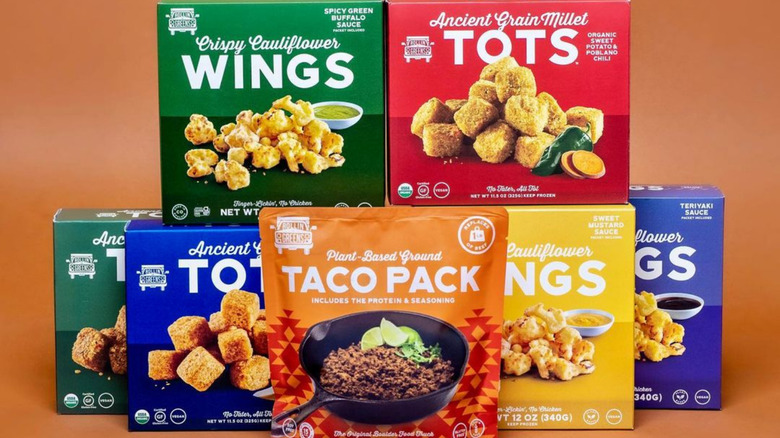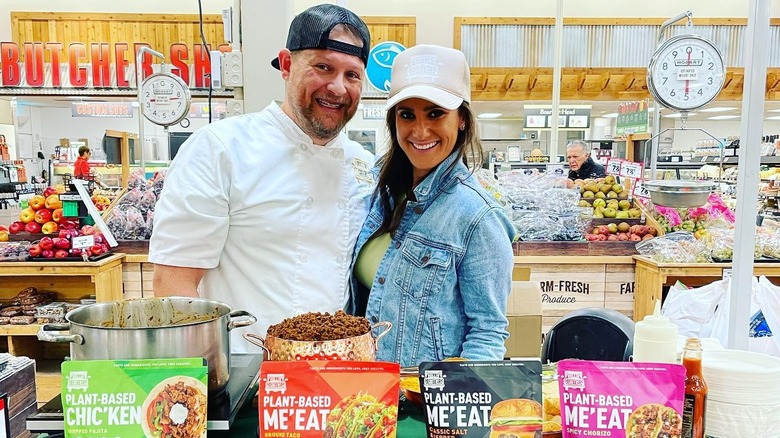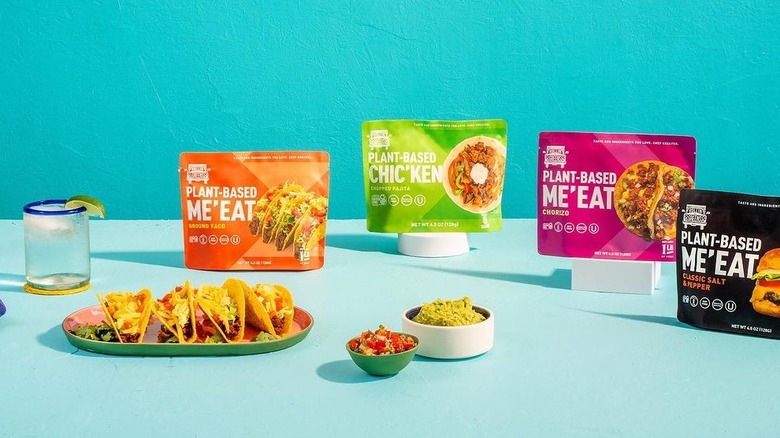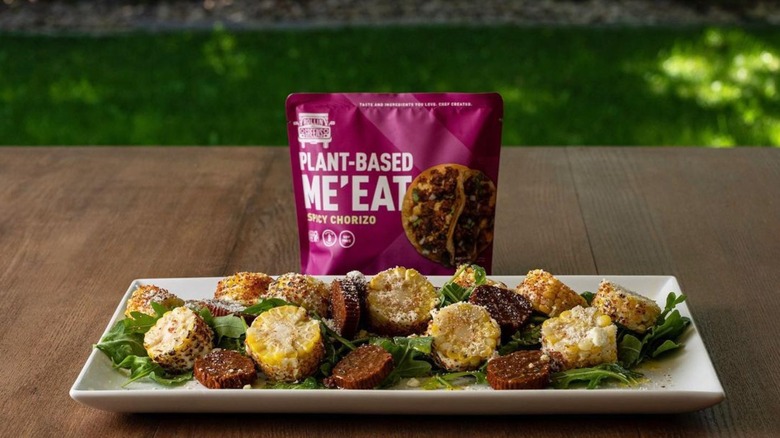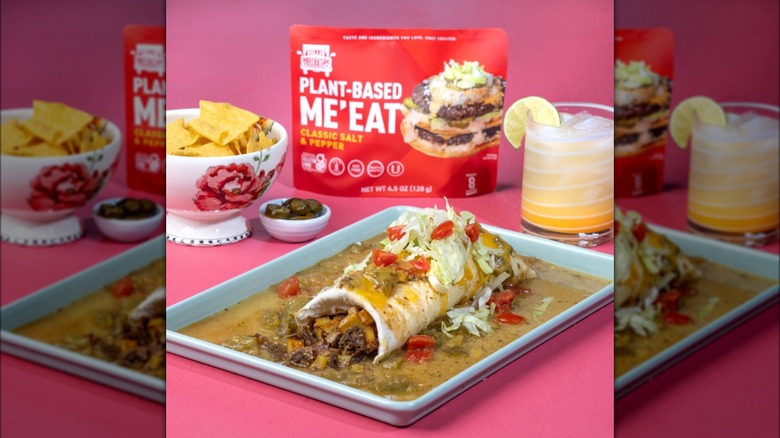Rollin Greens: Here's What Happened After Shark Tank
We may receive a commission on purchases made from links.
When you think of those unbelievably versatile tater tots, it's crisp, bite-sized cylinders made from deep-fried potatoes that come to mind. But when partners-turned-entrepreneurs Lindsey and Ryan Cunningham walked into the finale of "Shark Tank's" eleventh season, their line of frozen tots came with a twist: They were made from millet instead of potatoes.
The Cunninghams had known each other since childhood, but it wasn't until college that the duo got together, bonding over their shared love for food. Together, with Ryan's experience as a personal chef and Lindsey's background in public relations, the duo launched a food truck in Boulder in 2015. It was then that the co-founders learned that running a food truck was perhaps in Ryan's blood. Ryan's parents too operated an organic food truck named Rollin Greens back in the 1980s, and it was here that the duo found the name for their new business. In fact, the idea for using millet to make their tots too was inspired by Ryan's childhood where the grain was a staple thanks to his mother and her love for plant-based cooking.
The newly revamped Rollin Greens used local produce to serve nutritious meals to the citizens of Boulder, but there was one dish that had people lining outside the truck — Chef Ryan's millet tots. Sensing a huge opportunity, the duo decided to pivot from the food truck business and focus on selling their millet tots instead, turning them into packaged frozen food that could be sold nationwide.
What happened to Rollin Greens on Shark Tank
Armed with samples of their millet tots and newly launched plant-based cauliflower wings, the Cunninghams hoped to woo the Sharks into investing $500,000 in exchange for a 10% stake in Rollin Greens. While the frozen foods certainly seemed to be a quick hit in the Tank, the Sharks were not without concerns. Lori Greiner loved how everything tasted, reminiscing about her experience with Bantam Bagels, and noting how when something tastes good, it will develop a following. While Greiner was ready to make an offer, her only condition was that fellow Shark Daniel Lubetzky join her. However, Lubetzky wasn't convinced.
Rollin Greens had made $320,000 in sales in 2018 and was on track to double that to $700,000 by the end of the year of its filming. However, the company was burning a large amount of cash. To add to that, the Sharks weren't thrilled about the slim 35% margin on Rollin Greens' frozen foods and the lack of focus on the entrepreneurs' part. Both Lubetzky and Greiner backed out of the deal, quickly followed by Mark Cuban and Kevin O'Leary — the latter adding that the entrepreneurs would need at least a 50% margin to break even. Ultimately, it was Robert Herjavec who offered the Cunninghams a deal. Despite their lack of direction, he believed in the company's mission to promote clean plant-based food and shook hands with the Cunninghams in exchange for 20% equity in Rollin Greens.
Rollin Greens after Shark Tank
Although the Cunninghams accepted Robert Herjavec's offer in the Tank, the deal never materialized after the show. Despite the lack of funding, however, not all was lost. As is the case with several businesses featured on the show, Rollin Green too benefitted from what's known as the Shark Tank effect. After its episode aired, nationwide publicity generated more interest in Rollin Greens' frozen offerings, which in turn brought the company new customers and more sales.
The Cunninghams told BizWest that traffic on their website in the three weeks following the airing of their episode had increased by 40,000% compared to the previous year — triple the activity it saw in all of 2019. Lindsey admitted to the publication that, "it's kind of a weird number to even comprehend because it's so massive. But it is what it is, and it's amazing: the Shark Tank effect."
Rollin Greens was also featured on three QVC segments where it sold out each time. The company even went on to win QVC's best plant-based food award in 2021. Additionally, the entrepreneurs had projected that Rollin Greens would reach $5.5 million in revenue by 2020. While it's unclear whether or not they met their goal, nearly half of what they did make that year came through online sales that resulted from their appearance on "Shark Tank."
Is Rollin Greens still in business?
Not only is Rollin Greens still in business, but it seems to be thriving by the looks of it. That said, it has a very different approach from what it did during its time in the Tank. Since appearing on the show, the entrepreneurs have completely overhauled their original offerings while revamping the packaging as well. Rollin Greens launched a new line of shelf-stable plant-based products called ME'EAT in 2021. The first in the lineup was ground taco meat made from pea protein, which became a quick hit on QVC, Thrive Market, and Weight Watchers. The entrepreneurs went on to introduce plant-based chorizo and chopped fajita-style chicken while also making a drastic change to their existing products: They discontinued their millet tots in 2022.
Although the tots were sold in 3,500 stores across the U.S., including Walmart, Kroger, and Whole Foods, the margins remained frustratingly slim. Supply chain issues after the pandemic only made their production more costly. Additionally, converting customers into millet tot enthusiasts proved a tough marketing challenge. Even the cauliflower wings are no longer listed on the company's website as of April 2024. Instead, Rollin Greens transitioned into a fully plant-based meat business, and its new products seem to be more popular — with higher margins too. The plant-based chicken even won BrandSpark's best alternative meat category in 2024.
What's next for Rollin Greens?
At one point, the Cunninghams hoped to add more frozen foods to their line of millet tots and cauliflower wings. With the shift to the more shelf-stable meat alternatives, however, Rollin Greens' future is firmly in the plant-based meat industry, much like other "Shark Tank" businesses such as Atlast Monroe. Nevertheless, the company's ethos remains the same: creating plant-based foods from natural ingredients without compromising on taste.
As of 2023, Rollin Greens' new products were in almost 4,500 stores across the country, including the likes of Raley's, Sprouts, and Whole Foods. Additionally, Walmart increased Rollin Greens' presence from 1,700 to 2,400 of its stores, and Sprouts' moved it from the Innovation Centre to a more permanent location in its outlets — meaning the plant-based meats are now stocked in almost 500 stores. However, that number is likely to only get higher in the future. The entrepreneurs also plan to add new products to their existing line of ME'EATS, as well as introduce new categories entirely. There may even be plans to roll out nutritious ready-to-go meals in the future. Besides, with an experienced chef as the company's co-founder, the possibilities for innovation are endless!
"Shark Tank" is available for purchase on Prime Video.

